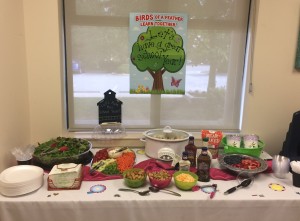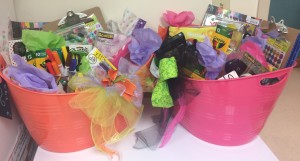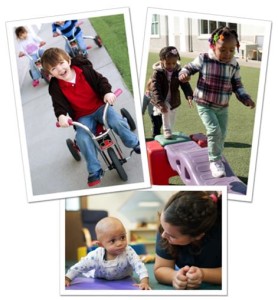From the Principal’s Desk:
Transition Is A Journey
On the first day of school children may experience multiple changes such as different classroom arrangements, new teachers, and unfamiliar routines. Other events such as the birth of a sibling or divorce also result in numerous changes children must adjust to.
Often when we think about transition we think of these major events. However, transition is much more than a one-time event. Instead, it is like a journey that takes time, preparation, and planning. Adults can help make each child’s journey into new territory most successful by supporting them before, during, and after the major change occurs. Parents and teachers need to work together sharing the unique information they have about the child and what support he or she may need.
Adults can better provide guidance and support when they understand the stages associated with adapting to change. These stages and specific examples of ways to support children as they transition to new early childhood settings are described below.
Letting Go Stage
Feelings of sadness and resistance are common as children prepare to leave a familiar setting or situation. Children need to express how they feel. Some may act fussy or whiney. Others may loose control, cry easily, or revert to habits you thought they had outgrown, such as thumbsucking.
Depending on the age of the child, adults can help children express themselves by reading stories about children in similar situations and talking with them about their feelings. Adults can work with preschoolers and older children to put together scrapbooks or make other mementos of who or what they want to remember.
Don’t forget transitions are also a time to celebrate children’s growth. Let them know how much they have grown by celebrating with other classmates, reviewing baby pictures, or pointing out new accomplishments like writing their names.
Uncertainty Stage
Transition can cause fears, concerns, and mixed feelings. Often children are confused about exactly what will happen next.
All young children moving into new early childhood settings need to visit the setting ahead of time and practice new routines to anticipate what will be different. It helps to start children in the program for short periods and gradually move them into the regular schedule. Letting them bring familiar objects from home is important, too.
Try to be clear about the things that are changing by answering any questions children have such as: When will we eat? Where is the bathroom? How will I get home? Will I see my old friends again?
Taking Hold Stage
Children in new situations need guidance about what is expected and affirmation when they are acting appropriately. Help them gain confidence by reviewing expectations and pointing out how they are learning.
Young children and their families need to feel welcome to a new setting. Children can be assigned a classroom buddy and their names can be displayed on cubbies or bulletin boards. Parents can be invited to a family night and involved on a daily basis as children are dropped off or picked up.
Remember that the more the new setting reflects children’s background and previous experiences, the more successful children will be in making the transition and meeting new challenges.
Erin
________________________________________________________________________
Inspirational Quotes for parents:

Volunteer Spotlight:

We want to thank Crystal Veinot for hosting a wonderful back to school luncheon for the teachers. This was a great event and the teachers loved the healthy lunch and the back to school buckets. We will be sending out more information on you can get involved in our fabulous parent group that focuses on teacher retention. This school is a better school because of our parent group. Thank you again Crystal for hosting the August Event.

 Important date to remember: Our annual Fall Festival will be on October 28th.
Important date to remember: Our annual Fall Festival will be on October 28th.
Parent Reminders
-
Please be sure to wash your child’s hands upon entering the classroom.
-
If your child has received any new immunizations, please make sure we have an updated record in your child’s file.
-
All outside food must be store bought.
-
Inform the front office if your emergency contact information changes.
-
Please sign your child in and out each day.
-
Label all your child’s belongings.
-
Please put appropriate foot wear on your child for active play.
It is time for our FALL ANCILLARY PROGRAMS





Tuesday Morning: Preschool Music Adventure is an original approach that successfully engages active preschoolers in musical activities, in order to enhance their overall development. We are very excited about this new music program. The new session begins on September 15th . Please click here to access the registration form.
Wednesday Afternoon: T.O.T (Teams of Tomorrow) is an awesome training program that focuses on basketball handling and dribbling skills. The onsite classes are fun, educational and active. TOTS will be returning in September 2nd. Please click here to access the registration form.
Thursday Morning: Soccer Shots is a popular non-competitive youth soccer program. This program teaches confidence, fun, character, teamwork, coordination and imagination. Our Demo will be on August 20th and the new session will begin on September 3rd. Please click here for the registration form.
Thursday Afternoon: Daisy Dance is a ballet, tap and a creative movement dance program designed to teach children a life long love of movement and provide a foundation for all dance genres. Daisy Dance will return September 10th. Please click here for the registration form. You can add dance at the beginning of each month.
Friday Morning: King Tiger Tae Kwon Do is taught according to individual needs and levels of skills. Students begin to establish, and actually achieve, personal goals. Students learn that, by setting realistic goals and applying dedication and hard work, anything is possible. They develop confidence! The virtues of Respect, Concentration, Discipline, and Motivation are the characteristics of a truly confident individual. The new session begins on September 4th. Please click here to access the registration form.
From the Education Department
Developing Balance Skills in Young Children
From Tummy Time to Bike Riding
Balance is a fundamental skill necessary for maintaining controlled positions, such as sitting in a chair, or engaging in physical activities like running or riding a bike. Having balance makes motor skill development easier, reduces the risk of injury, and helps children focus on academic tasks. Our Nobel Learning Education team stays up to date with the latest research to ensure that our Links to Learning curriculum exceeds childhood learning standards. The Links to Learning curriculum was enhanced last fall to include a greater focus on balance, a building block for skills such as hand-eye coordination, muscular strength and body awareness. Here are some ways we help improve balance in the classroom, as well as ideas for you and your child to do at home. INFANTS: In the classroom: Tummy time promotes neck, back and abdominal strength needed for infants to eventually push up, roll over, sit up and crawl. Teachers keep infants engaged by using activity mats or plush blocks. At home: Place your baby on his stomach and shine a flashlight near him. Once you have captured his attention, shine the light in a rhythmic pattern. For older infants, encourage your baby to move or crawl toward the light. TODDLERS (ages 1-2): In the classroom: During the toddler years, children make major strides in balance and coordination. Teachers play music and encourage students to move their bodies in different ways while maintaining their balance. At home: Push and pull toys require children to use core balance and arm strength, which can be difficult for new walkers. Place a small wagon or toy shopping cart and a pile of blocks on the floor. Show your child how to fill the cart with blocks. He will enjoy pulling or pushing the blocks around the room. BEGINNERS (ages 2-3): In the classroom: Sitting cross-legged, or as we say with the children “criss-cross applesauce,” is an important developmental skill for two year olds. Teachers encourage children to sit criss-crossed anytime they are playing on the floor. Sitting in this position strengthens a child’s core muscles and helps improve body control. We discourage “W-sitting,” with knees together and feet on either side of the hips, because it puts strain on knees and hips and fails to engage core abdominal muscles. At home: Provide your child with a sit-and-spin toy. Ask him to sit on the toy with his legs crisscrossed. As he turns the wheel to spin, he will gain a better understanding of cause and effect. INTERMEDIATES (ages 3-4): In the classroom: Around age three, children learn to maintain control of their upper body while moving their lower body. Our Intermediate students practice pedaling a tricycle, bouncing on hopper balls, and walking on a balance beam. At home: Have your child practice running and stopping with control by playing the traffic light game. Shout out the color green, yellow or red. Have him move quickly when hearing “green,” move slowly when hearing “yellow,” and completely stop when hearing “red.” PRE-K/PRE-K 2 (ages 4-5): In the classroom: Teachers encourage children to practice balance and coordination by jumping on their non-dominant foot, walking on a line or beam, or jumping rope. Children also practice balance by crouching down to tie their shoes. At home: Ask your child to tell you about the games and activities played at school. Include these activities at home and during family events such as birthday parties and vacations. Scooters and pogo jumpers are great toys for children at this age. Good balance helps children maintain appropriate and controlled body movement during important tasks. By building balance skills in the preschool years, your child will be better prepared as he enters elementary school and beyond. – Lauren Starnes, PhD – Director of Early Childhood Education
This entry was posted in Mooresville. Bookmark the
permalink.
Edit

September Newsletter
From the Principal’s Desk:
Transition Is A Journey
On the first day of school children may experience multiple changes such as different classroom arrangements, new teachers, and unfamiliar routines. Other events such as the birth of a sibling or divorce also result in numerous changes children must adjust to.
Often when we think about transition we think of these major events. However, transition is much more than a one-time event. Instead, it is like a journey that takes time, preparation, and planning. Adults can help make each child’s journey into new territory most successful by supporting them before, during, and after the major change occurs. Parents and teachers need to work together sharing the unique information they have about the child and what support he or she may need.
Adults can better provide guidance and support when they understand the stages associated with adapting to change. These stages and specific examples of ways to support children as they transition to new early childhood settings are described below.
Letting Go Stage
Feelings of sadness and resistance are common as children prepare to leave a familiar setting or situation. Children need to express how they feel. Some may act fussy or whiney. Others may loose control, cry easily, or revert to habits you thought they had outgrown, such as thumbsucking.
Depending on the age of the child, adults can help children express themselves by reading stories about children in similar situations and talking with them about their feelings. Adults can work with preschoolers and older children to put together scrapbooks or make other mementos of who or what they want to remember.
Don’t forget transitions are also a time to celebrate children’s growth. Let them know how much they have grown by celebrating with other classmates, reviewing baby pictures, or pointing out new accomplishments like writing their names.
Uncertainty Stage
Transition can cause fears, concerns, and mixed feelings. Often children are confused about exactly what will happen next.
All young children moving into new early childhood settings need to visit the setting ahead of time and practice new routines to anticipate what will be different. It helps to start children in the program for short periods and gradually move them into the regular schedule. Letting them bring familiar objects from home is important, too.
Try to be clear about the things that are changing by answering any questions children have such as: When will we eat? Where is the bathroom? How will I get home? Will I see my old friends again?
Taking Hold Stage
Children in new situations need guidance about what is expected and affirmation when they are acting appropriately. Help them gain confidence by reviewing expectations and pointing out how they are learning.
Young children and their families need to feel welcome to a new setting. Children can be assigned a classroom buddy and their names can be displayed on cubbies or bulletin boards. Parents can be invited to a family night and involved on a daily basis as children are dropped off or picked up.
Remember that the more the new setting reflects children’s background and previous experiences, the more successful children will be in making the transition and meeting new challenges.
Erin
________________________________________________________________________
Inspirational Quotes for parents:
Volunteer Spotlight:
We want to thank Crystal Veinot for hosting a wonderful back to school luncheon for the teachers. This was a great event and the teachers loved the healthy lunch and the back to school buckets. We will be sending out more information on you can get involved in our fabulous parent group that focuses on teacher retention. This school is a better school because of our parent group. Thank you again Crystal for hosting the August Event.
Parent Reminders
It is time for our FALL ANCILLARY PROGRAMS
Tuesday Morning: Preschool Music Adventure is an original approach that successfully engages active preschoolers in musical activities, in order to enhance their overall development. We are very excited about this new music program. The new session begins on September 15th . Please click here to access the registration form.
Wednesday Afternoon: T.O.T (Teams of Tomorrow) is an awesome training program that focuses on basketball handling and dribbling skills. The onsite classes are fun, educational and active. TOTS will be returning in September 2nd. Please click here to access the registration form.
Thursday Morning: Soccer Shots is a popular non-competitive youth soccer program. This program teaches confidence, fun, character, teamwork, coordination and imagination. Our Demo will be on August 20th and the new session will begin on September 3rd. Please click here for the registration form.
Thursday Afternoon: Daisy Dance is a ballet, tap and a creative movement dance program designed to teach children a life long love of movement and provide a foundation for all dance genres. Daisy Dance will return September 10th. Please click here for the registration form. You can add dance at the beginning of each month.
Friday Morning: King Tiger Tae Kwon Do is taught according to individual needs and levels of skills. Students begin to establish, and actually achieve, personal goals. Students learn that, by setting realistic goals and applying dedication and hard work, anything is possible. They develop confidence! The virtues of Respect, Concentration, Discipline, and Motivation are the characteristics of a truly confident individual. The new session begins on September 4th. Please click here to access the registration form.
From the Education Department
Developing Balance Skills in Young Children
From Tummy Time to Bike Riding
Balance is a fundamental skill necessary for maintaining controlled positions, such as sitting in a chair, or engaging in physical activities like running or riding a bike. Having balance makes motor skill development easier, reduces the risk of injury, and helps children focus on academic tasks. Our Nobel Learning Education team stays up to date with the latest research to ensure that our Links to Learning curriculum exceeds childhood learning standards. The Links to Learning curriculum was enhanced last fall to include a greater focus on balance, a building block for skills such as hand-eye coordination, muscular strength and body awareness. Here are some ways we help improve balance in the classroom, as well as ideas for you and your child to do at home. INFANTS: In the classroom: Tummy time promotes neck, back and abdominal strength needed for infants to eventually push up, roll over, sit up and crawl. Teachers keep infants engaged by using activity mats or plush blocks. At home: Place your baby on his stomach and shine a flashlight near him. Once you have captured his attention, shine the light in a rhythmic pattern. For older infants, encourage your baby to move or crawl toward the light. TODDLERS (ages 1-2): In the classroom: During the toddler years, children make major strides in balance and coordination. Teachers play music and encourage students to move their bodies in different ways while maintaining their balance. At home: Push and pull toys require children to use core balance and arm strength, which can be difficult for new walkers. Place a small wagon or toy shopping cart and a pile of blocks on the floor. Show your child how to fill the cart with blocks. He will enjoy pulling or pushing the blocks around the room. BEGINNERS (ages 2-3): In the classroom: Sitting cross-legged, or as we say with the children “criss-cross applesauce,” is an important developmental skill for two year olds. Teachers encourage children to sit criss-crossed anytime they are playing on the floor. Sitting in this position strengthens a child’s core muscles and helps improve body control. We discourage “W-sitting,” with knees together and feet on either side of the hips, because it puts strain on knees and hips and fails to engage core abdominal muscles. At home: Provide your child with a sit-and-spin toy. Ask him to sit on the toy with his legs crisscrossed. As he turns the wheel to spin, he will gain a better understanding of cause and effect. INTERMEDIATES (ages 3-4): In the classroom: Around age three, children learn to maintain control of their upper body while moving their lower body. Our Intermediate students practice pedaling a tricycle, bouncing on hopper balls, and walking on a balance beam. At home: Have your child practice running and stopping with control by playing the traffic light game. Shout out the color green, yellow or red. Have him move quickly when hearing “green,” move slowly when hearing “yellow,” and completely stop when hearing “red.” PRE-K/PRE-K 2 (ages 4-5): In the classroom: Teachers encourage children to practice balance and coordination by jumping on their non-dominant foot, walking on a line or beam, or jumping rope. Children also practice balance by crouching down to tie their shoes. At home: Ask your child to tell you about the games and activities played at school. Include these activities at home and during family events such as birthday parties and vacations. Scooters and pogo jumpers are great toys for children at this age. Good balance helps children maintain appropriate and controlled body movement during important tasks. By building balance skills in the preschool years, your child will be better prepared as he enters elementary school and beyond. – Lauren Starnes, PhD – Director of Early Childhood Education
News Archive